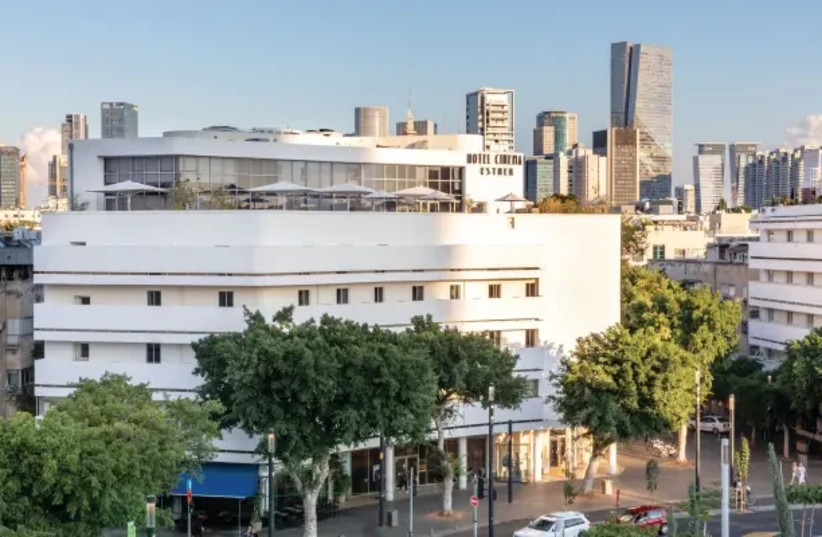Many of us are struggling to keep our spirits up during this time of war, and the organizers of Spirit: The Spiritual Film Festival, which promotes awareness and personal well-being around the world, also struggled with whether they should hold the festival at all this year.
Eventually, they decided that it was appropriate for the festival to take place, and after being postponed from November, it will be held from February 28 to March 2 in a special format at the Tel Aviv Cinematheque.
The festival’s founders and directors, Harsita and Anamika Eshel, released a statement emphasizing that they think that, now more than ever, there is a need for content that inspires people spiritually and helps build resilience to cope with the traumatic and frightening times that Israelis are experiencing:
“In these difficult and complex times, our goal is to create a place of encounter and unity, of refuge and hope, to give the audience the opportunity to disconnect for a few hours from everything that is happening around and to be inspired by consciousness-expanding content.”
The dozens of films in the festival will be screened in three of the Tel Aviv Cinematheque’s auditoriums, from morning till midnight. The festival will include feature films, documentaries, shorts, and animated films. This year, for the first time, there will be an Israeli Short Film Competition.

THE FILM that opens the festival this year comes straight from the Toronto International Film Festival: The Monk and the Gun, the new film by Pawo Choyning Dorji.
Dorji, who made the crowd-pleasing, Oscar-nominated film Lunana: A Yak in the Classroom, is a devout Buddhist from Bhutan who is a student of the Buddhist master and filmmaker Khyentse Norbu, who made the film The Cup.
The Monk and the Gun finds Dorji turning his lens back toward the magnificent landscapes of the Himalayas, and focuses on a culture clash between a monk and an American antiquities collector, set against the backdrop of the 2006 elections in Bhutan.
The movie, which made this year’s Oscar short list, has drawn praise for the way it tells a complex story of the pull toward modernity and the charms of tradition with gentle humor. The film will be distributed later throughout Israel by the Lev Cinemas chain.
The Monk and the Gun is the perfect example of the kind of movie that exemplifies the many themes the festival films cover. The rest of the movies encompass a wide range of topics, from all around the world. It’s no coincidence that quite a few other movies in the festival come from Asia, where many have long practiced mindfulness and meditation, focusing on spiritual rewards.
Foodies will enjoy The Zen Diary by Yuji Nakae, about a food writer in Nagano, Japan, who writes a book about the seasonal delights that he gathers and cooks, sometimes with the help of his editor/girlfriend, while still struggling to coming to terms with his wife’s death.
It’s a soothing look at a man who has found a way to live that allows him to embrace his love for nature and to use this love to express himself creatively.
Another highlight of the festival will be The Eternal Memory by Maite Alberdi, an acclaimed documentary that tells the story of a Chilean political reporter who fought to uncover the crimes of the Pinochet regime, and who has recently been diagnosed with Alzheimer’s. This tough-minded reporter now fears the day he will no longer recognize his partner.
Tukdam: Between Worlds, by Donagh Coleman, is a glimpse into the extraordinary world of “meditators,” Tibetan monks who have experienced clinical death consciously and who challenge the worlds of medicine and science.
Dark Red Forest, by Huaqing Jin, is a visually stunning chronicle of the journey of 20,000 Tibetan nuns who make a pilgrimage to a snow-covered plateau.
Theatre of Thought, by master director Werner Herzog, features interviews with researchers who try to deepen their knowledge of the nature of human consciousness.
Many movies in the festival look at alternative methods of healing, and among these is Tyler Chandler and Nicholas Meyers’s Dosed: the Trip of a Lifetime, which looks at the journey of a mother who is granted the legal right to use hallucinogenic mushrooms for medical purposes.
Lectures by experts and professors
A festival tradition that will continue this year is lectures by experts that precede the screenings of many films.
Among the lectures scheduled for the festival are meetings with: Prof. Jacob Raz (former head of the department of East Asian studies at Tel Aviv University) following the film Zen Diaries; Dr. Nader Buto on the subject of integrative medicine, after the film Becoming Nader – A Spiritual Healing Journey; Leila Kamhi, who leads spiritual journeys around the world, following the film Wild Women; Yoav Bar-Yosef, a medical psychologist, who will speak on pain treatment as it is shown in the movie Pain and Brain.
The festival is held in cooperation with the Tel Aviv Cinematheque. To see the full program and to order tickets, go the festival website at https://www.spiritfestival.co.il/english
